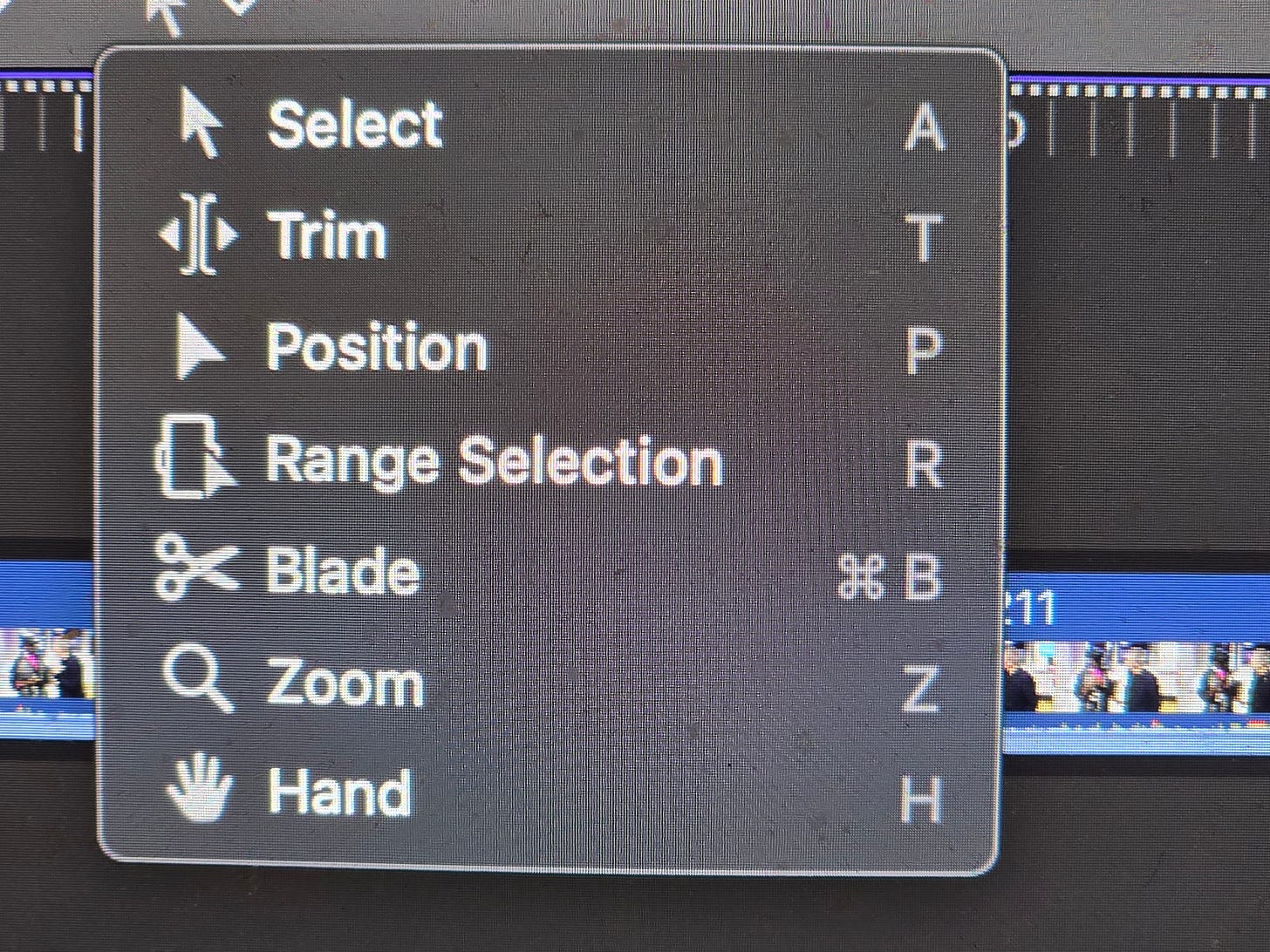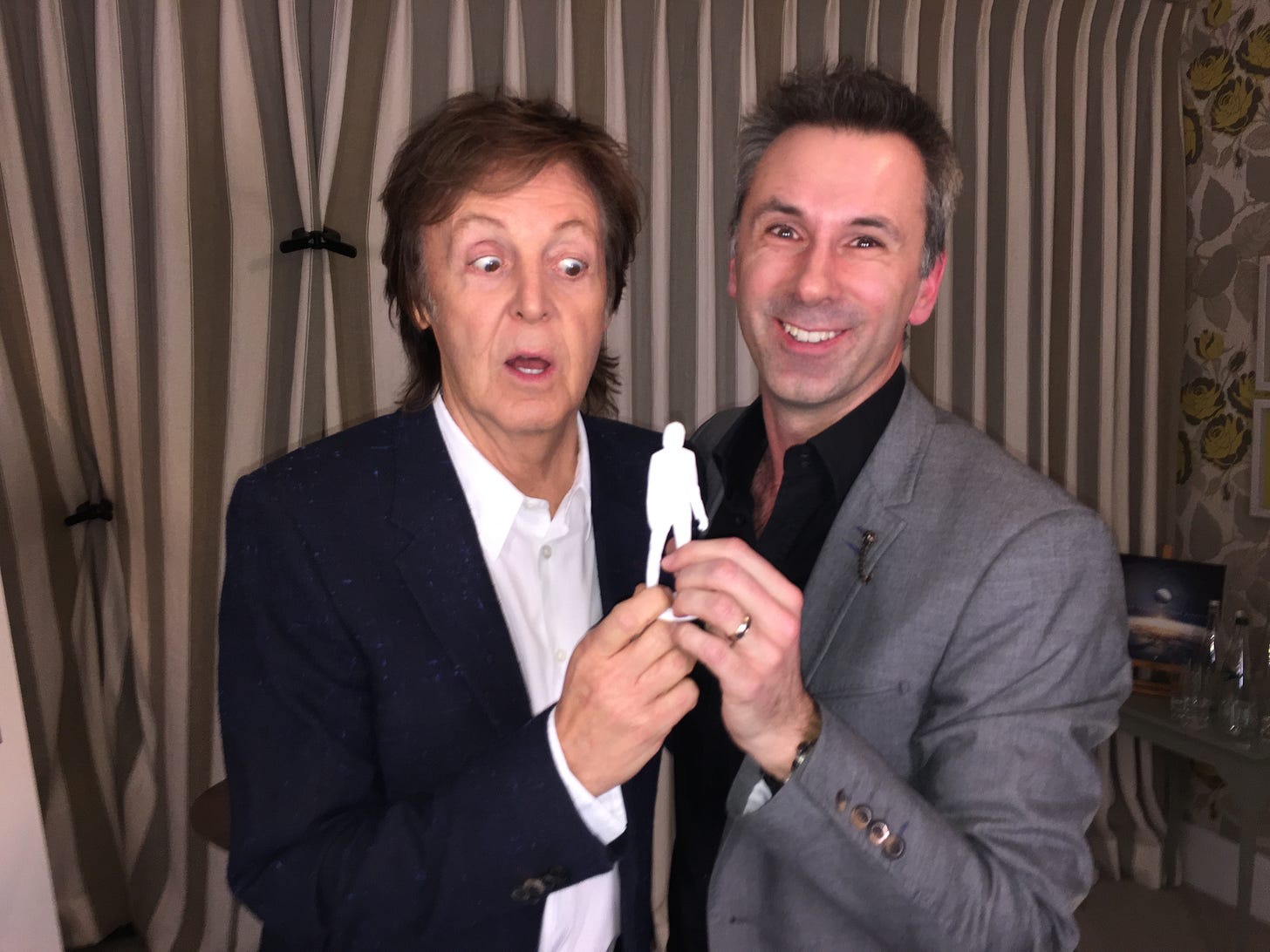“Sir, please take a step back.”
I’m slightly annoyed at will.i.am’s security guard. He’s only doing his job, of course, but he doesn’t know that I know will (friend of the show, mate, and henceforth uncapitalised), and I’m just trying to politely get in his eyeline while he’s talking to his manager.
I take one sarcastic step back, and then ask the chap “is that okay?”
Clearly sensing my attitude, he responds: “Two more steps.”
This is not going well.
I’m filming at the LG booth at CES, the massive annual Consumer Electronics Show held every January in Las Vegas, and for which I’ve provided survival tips in a previous newsletter (in summary: lip oil and emergency spoons). The Korean electronics giant has just launched a range of audio products in collaboration with will.i.am, who surprised everyone by making an appearance at the company’s press conference two days previously.
will and I have met a few times before, so after the press conference I popped down to the front to see if I could go backstage. However, I missed my opportunity after tripping over a monitor speaker, executing a prat-fall worthy of Norman Wisdom/Jim Carrey/Mr Bean* and spending some minutes repairing my knee, and then my pride.
(*delete as age-applicable)
It was only once CES had fully opened that I happened upon the Black Eyed Pea in person. There I was, part way through my filming tour of the big booths, and there will was, doing a tour of his own products. So I thought I’d say hi and see if he was up for an interview. I had no questions planned, but with will there’ll always be something to chat about.
All I had to do was catch his eye. That’s when I ran into security problems.
What makes a good interview/ee/er?
I’ve interviewed thousands of people over the last 30 years, and I’m often thanked for making the experience “more comfortable than expected”, “relaxed”, and sometimes even “fun”. Because, let’s face it, most people absolutely hate being interviewed - it’s an unnatural situation in which you have to look natural. You find yourself watching every word you say, regretting everything you did say and wishing you’d said everything you didn’t say.
The relief felt by some guests when I stop recording is palpable. Seriously, straight after an interview is the most relaxed you’ll ever feel. It’s a bit like the first few minutes after a hard sports massage - the best thing about which is that they do eventually end.
The boss of a strategic comms company told me recently that he regularly sees very senior execs reduced to nervous teenagers during interviews - they sit down under the lights, try - and fail - to ignore the camera that’s poking in their face, and then forget how to string a sentence together.
Now, I actually believe that part of the journalist’s job is to relax you, but that’s a skill in itself (saying “just pretend the camera’s not here” is a bit like saying “don’t think of a grey elephant from Denmark”, and saying “just act natural” is the equivalent of standing on a street corner, whistling, doffing your cap to a passing police officer and pretending you’re not about to rob a bank).
Of course, a journalist can also, deliberately or accidentally, make you very uncomfortable instead.
Indeed, a skilled interviewer holds all the power in these situations. They can make you look good or bad. And importantly, that’s not just during the recording - it’s in the edit too.
Because that’s where the real magic happens, and this is one of the many things that interviewees don’t realise about the interview process. The edit suite is where pauses are removed, ums and ers are cut, and answers tightened up.
All those things you were worried about are erased, and what actually comes into the spotlight is your ability to come across as human, make your points succinctly, and - oh yes - remember to make your points in the first place.
The three R’s - Rehearse, rehearse, rehearse
This is why smart interviewees get interview-training. Putting themselves in the situation, practicing their answers, and having a trainer pose difficult questions allows them to work through different scenarios and find the right form of words before they actually need them.
The reality is, your best answers, your crispest soundbites and your deftest defences are unlikely to come to you in the heat of the moment. No, the perfect turn of phrase will most likely come to you after a few attempts, and, once you’ve found it, saying it over and over again means it’s more likely to roll naturally off your tongue when required.
Just ask the experts. Because you don’t just get skilled interviewers, you get skilled interviewees too - you know them, they’re those commentators, experts and politicians who appear again and again on talk shows, on the news, and on live TV. If you can give good soundbites, journalists will remember you and will call you whenever they need a quick hit.
Michael Gove, Nigel Farage - whatever you think of their politics, they’re great communicators. Simon Calder - he’s your go-to travel expert. I too have people on speed-dial who I know are excellent for tech-related opinions. All these people have practiced and practiced, and are excellent at relating, conveying and, yes, simplifying, ideas for a general audience.
Being a skilled interviewee doesn’t just help when you’re up against a hard-ball journalist either. Plenty of things can happen during the interview which can distract you from your flow and it’s useful to be prepared for them.
The journalist may be in a rush, they may be having technical problems, they may not know much about the subject themselves. They might be nervous because you’re the boss of the biggest company in the world and they are fairly new at their job.
I’m looking at you Bill Gates, and you Spencer Kelly from 2007.
Tech geek technique
After flying to Edinburgh to sit and listen to Gates plus the then-PM Gordon Brown talk in the Scottish Parliament (and learning some valuable lessons from Brown about the best way for politicians to get their message across), I got to film my first big interview - with the co-founder of Microsoft.
Bill Gates famously wasn’t the warmest of interviewees, and so my boss and I had discussed how to get the best out of him on camera. My plan was simple - don’t go for the jugular, don’t go straight in with hard-hitting questions (which he would have been media-trained to bat away), but instead geek out with the guy. Show him I know what I’m talking about and that I’m genuinely interested. And, once he trusts me, once he relaxes, then I can ask him harder questions and challenge him on more pressing topics.
I think it worked. Gates seemed to quite enjoy the chat, and I remember at one point he told me that the latest version of Windows “didn’t neigh like a horse, but that doesn’t mean it’s substandard”. I may be misremembering, I grant you.
This geek-out technique is something I’ve used throughout my career, and I’ve been lucky enough to get some good stuff out of some big names, from director James Cameron pointing an imaginary spear in my face to me revealing to Sir Paul McCartney that he is the only artist to have had a number one single as a solo performer, in a duo, a trio, a foursome, a fivesome, a sixsome, a ninesome and as a twentysomethingsome.
But I’ve generally had the luxury of time to prepare for the interview, plus the enthusiasm and knowledge to make it an interesting chat. Not all journalists are in that situation, and it may be down to you to perform, regardless of the person asking the questions.
So get yourself some interview training. You’ll thank me later.
will.i.ng.and.able
Once I’d finally caught will’s eye, all was well - we hugged, we chatted, and he surprised me with his views on AI music. He’s a geek, I’m a geek, we could have chatted for hours. In fact over the years we probably have.
This was an impromptu interview and, as such, will had the right to say no, but he’s a professional interviewee. He was thoughtful, he wasn’t afraid of pausing after some of my more searching questions (we’d edit those out later), and he had the on-camera presence that is one of the many reasons why big companies want to associate him with their products.
Some of that stuff you can’t teach.
But I’m convinced that some of it, you can.
Click at CES 2025, featuring will.i.am, is available in the UK on BBC iPlayer.








Love your work Spencer.
You’re a legend.